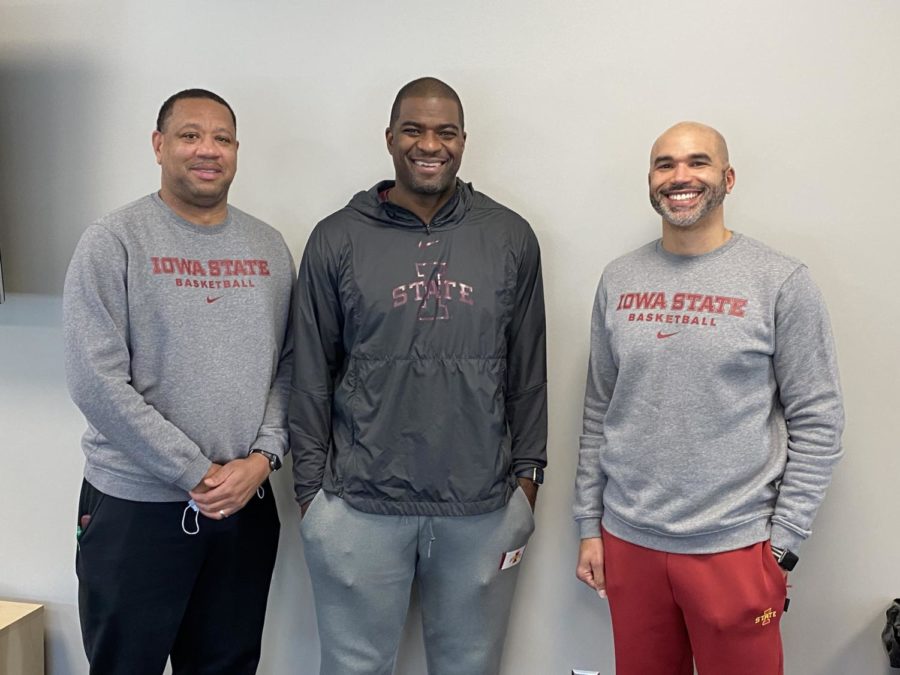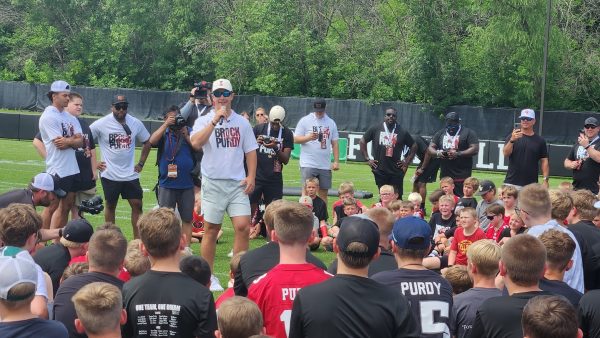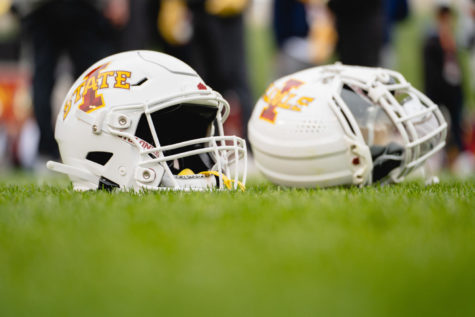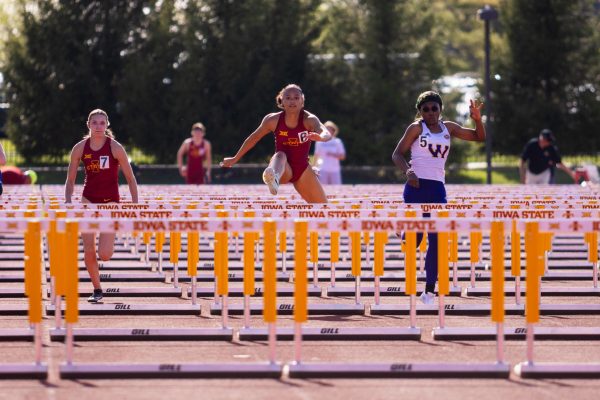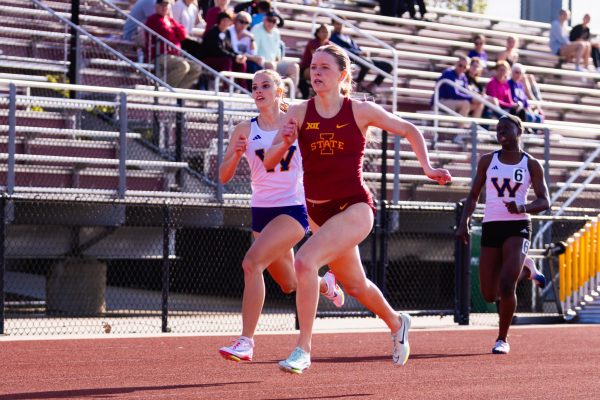‘Bigger than just a moment’: The people behind BACA, working to better student athletes
February 21, 2021
Daniyal Robinson could feel there was anger in the air during the summer of 2020.
After the killings of George Floyd, Breonna Taylor, Jacob Blake and countless Black people across the U.S. during the summer, thousands throughout the nation, including Iowa State student athletes, took to the streets to protest the tragedies.
Robinson watched as Americans, young and old, cried, screamed and begged for their country to change. Unfortunately, he had felt this way before. The anger, the pain and even guilt all began to creep back into a heart that had already experienced enough tragedy in the Black community in America.
As an Iowa State men’s basketball assistant coach going on five seasons, Robinson watched how emotional his players were during the summer, with fear and visible frustration after what they all witnessed. The nation was bound by a collective frustration and anger.
He felt he needed to do something.
After calling across the Big 12 to other coaches and friends, Robinson began to have Zoom calls with other coaches about social issues and what they could do to make sure their athletes felt safe and valued as human beings before anything they do on the court.
Every Wednesday during the summer while everyone was separated back in their own homes thanks to COVID-19 restrictions, Robinson and Iowa State coaches met with the men’s basketball team over Zoom. The conversations would range from broad topics the team wanted to talk through to how the they wanted to tackle the issues in a constructive way.
The discussions took time to develop over the numerous video calls with other staff members throughout the Big 12, but Robinson and many others in the conference started to talk about a unified vision to serve their school’s respective student athletes, a vision with a set of core values that everyone could share and promote.
And thus, the Big 12 Black Assistant Coaches Alliance (BACA) was born.
The time is now
Iowa State men’s basketball Director of Operations Micah Byars had always wondered when his generation or the generations after him would have to face their own seminal moment of change.
The Civil Rights Movement of the 1950s and 1960s are hard to compare to the challenges of present day, but Byars said the need for drastic change and awareness is just as necessary.
BACA was a great example of some real change Byars was hoping would come out of the summer and last long into the future.
“You always wonder, ‘What’s the seminal moment or moments that are going to occur in my generation?’” Byars said. “You see Montgomery Bus Boycotts, you see dogs attacking people on the Edmund Pettus Bridge, and you just sit there and you go, ‘Man, that’s not my generation, but if that ever happened with me, we’d be out in the streets.’ Well, here you go folks, this is here and it’s real.”
Byars isn’t making the claim to say civic involvement hasn’t been present at Iowa State and across the Big 12 in the past, but COVID-19 forced people to be locked in on their devices and the news. They couldn’t run from these issues. Not anymore.
Tragedy can often spark the biggest change in society. Robinson believes this to be true, but it became especially clear after watching the unrest and fear take center stage across the U.S. throughout the summer. It’s something he wishes didn’t move the needle, but that’s the harsh reality America has faced for its entire history.
Robinson, the chair of BACA, and many other Iowa State coaches and staff felt the events of the summer and the engagement people took from it is what made BACA’s beginning and traction feel real.
“A lot of times, these things happen you’ve seen over the years and it gets a lot of attention for a few months, maybe a year or so, and then over time, things settle back in, and I think this is something bigger than just a moment,” Robinson said. “Oftentimes, when there are adverse situations, positives come from it. It’s hard to see what you’ve seen, but you can’t ignore those things, and that creates a repetitive cycle.”
While the events of the summer were not unique in their outcome, Robinson agreed with Byars on how the ongoing COVID-19 pandemic kept many Americans in their own homes and drawn to their screens during the summer months.
In a normal year, families would have been on vacation and young people would have been seeing friends and maybe having the blissful ignorance of not realizing the larger problems in this country.
Iowa State players were proof of Robinson’s intuition. Over the summer and even when players returned to Ames, the engagement was through the roof in Robinson’s eyes. Players were ready for a dialogue, not simply a lecture from coaches about race issues in the United States.
Players have wanted to become educated on voting and racial tensions long before the name George Floyd became a household name. But like Robinson and Byars said, the sentiment in America might not have been at the right place to truly have the dialogue and experience that was necessary.
Byars has been with Iowa State men’s basketball for 10 seasons and has helped drive previous discussions for the team in his time in Ames, but once again, he made the point that the tragic events of the summer shaped the power BACA was able to get from the very start.
“I don’t know if this group [would have] the staying power if everyone’s eyes weren’t open to what was and what is going on nationally,” Byars said.
In the 2012 presidential election, Byars tried to get players on the Cyclones’ roster registered to vote. Back then, there was a church located near the practice facility called Willow Creek Open Bible Church that served as a polling site.
Byars recalled he took about five to six players over to get registered and vote.
“I took our student athletes over there, they voluntarily wanted to register to vote, and I said, ‘Hey guys, I’ll help you facilitate this,'” Byars said. “So I take them over there, and we’re standing in line and we go through the registration process. Someone was waiting in line behind us and said, ‘Can you hurry it up? We know who all these guys are gonna vote for already.’”
It was a moment Byars said he could have let get the best of him, but for the sake of the team, he kept his emotions hidden and tried to continue and educate the team on voting, but it served as a reminder of how many in America were not ready to see young Black men use their voice.
“They hear ‘Black coaches’ and they think, ‘They’re trying to push their agenda,’” Byars said. “Our agenda is awareness.”
William Small, who has spent five years as an Iowa State men’s basketball assistant coach, was ready for what BACA could bring to the table, just like the players and other coaches across the Big 12.
Small said the importance of educating and investing in the student athletes’ development off the court is more valuable than any practice could give. He saw the attention racial injustice and the importance of voting was gaining and was on board to create something fueled by the overwhelming awareness.
Small believes BACA’s start couldn’t have come at a better time.
“This idea should have been done a long time ago, to be honest with you,” Small said. “It was the perfect storm, actually.”
Initiatives for change
Before BACA could become BACA, Robinson and his fellow coaches had to do the legwork during the summer to come up with core values and effective initiatives for the organization to stand on.
The group decided on four main values: to educate, to unify, to serve and to support student athletes.
In order to truly learn from an adverse situation, Robinson and others in BACA believe you have to educate yourself on whatever you’re concerned about.
As for the importance of timing for BACA, Robinson said the group starting in the summer and growing into the fall, right when the 2020 election cycle was in the home stretch, was good timing.
BACA helped get every men’s and women’s basketball player at Iowa State registered to vote and also provided education on the process as a whole. Coaches had discussions with players explaining how local elections work, watching the debates and addressing the broad topic of civic responsibility.
Reginald Stewart, Iowa State’s vice president of diversity, equity and inclusion, was eager to assist Robinson and other Iowa State assistants in getting BACA off the ground floor, but to the welcomed surprise of Stewart, by the time Robinson reached out to him, they had already done most of the heavy lifting.
Stewart said those are his favorite type of phone calls. It’s not because it means he gets to do less work, but it shows the groups he is trying to help made a concerted effort to come up with ideas and simply need his connections across Iowa State and beyond.
“They weren’t waiting for someone to tell them what to do, come on in and save them,” Stewart said.
Stewart said when groups form to combat societal issues, they often come to him for what they should focus on and where they should turn their attention to instead of figuring out what they want for themselves. Stewart said Robinson and BACA was the opposite.
He could tell BACA was made to look for tangible ways to keep the conversation going, and with Robinson coming to him so prepared with initiative ideas in place and a system of core values, the implementation went much smoother than normal.
“It was a 100 percent total breeze, and that’s something you’ll never hear me say about anything we do in diversity and inclusion,” Stewart said.
When Byars realized BACA wanted to partner with the Big 12, under the umbrella of the Big 12 and all of the power it has, he became thrilled.
Without the backing of the conference, Byars said BACA could have been a group of Black assistant coaches with no real power to promote policy change and gain attention. Each school did the initiatives differently, but Byars said the backing of the Big 12 made everything so much easier to run and receive credibility.
Outside of voter education, Byars said BACA focused on financial literacy for the student athletes. What better way to show current players the importance of money management than bringing back former Cyclones who are currently in the NBA over Zoom?
Through the three-part portion on financial literacy, BACA brought back Georges Niang, Monte Morris, Stevie Johnson and other alumni to have an open conversation about financial tips for college and beyond, as well as a breakdown of taxes and mortgages.
Byars said it’s one thing for himself or Small to talk with the team, but when former players speak, it means more.
BACA also did initiatives on sexual violence awareness by bringing in guest speakers to talk about campus life and how players can be better educated on the issue.
One of the other big initiatives BACA started centered around police partnership and education. The issue of police brutality set off the raw emotion of the summer and the start of BACA, so coaches knew it would take a lot of time to give the team the best experience.
Byars said players were given information about the origins of police — not to say police were the enemy, but in order to educate them, Byars said you have to give the full picture. Byars has a degree in criminal justice and has many connections and friends in law enforcement.
Through the initial police partnership, BACA was able to bring in members of the ISU Police Department, the Ames Police Department and Chief Darius Potts of the Ankeny Police Department to talk with the men’s basketball team.
The coaches did an exercise where they put multiple players in chairs, which acted as a pretend car with two chairs in front and three in the back lined up next to each other.
Potts then did a walk-through of what he would be thinking in the scenario as he approached the makeshift car, which Byars said really allowed the athletes to learn in an intimate way.
“Chief Potts walked along, and in this scenario, there were all Black men in the car, and he said, ‘Well, the first thing I’d do is call for backup,’ and I said, ‘Well, why would you do that?’ and he goes, ‘These are just some big guys in here, and five people in a car is a little daunting,’ and for our players to hear a Black man say there was just a little bit of fear but it having nothing to do with skin color was huge,” Byars said. “And the reason we did that exercise in that manner was because if you know anything about athletes, they’re usually riding solo or they’re rolling six or seven deep in a car.”
But even with Stewarts’ help and all of the planning that took place during the summer, these initiatives had hurdles to get through.
Each initiative had to get the approval from each of the 10 head coaches in the Big 12, then it went up to Jeff Jackson, who serves as basketball oversight for the Big 12 as executive associate commissioner. After Jackson, all 10 athletic directors had to sign off, and finally, it had to be approved by Big 12 Commissioner Bob Bowlsby.
Robinson was able to sell the idea of BACA to all of the different personalities and experiences in the league, an accomplishment in its own right in Byars’ mind.
“Let’s make no mistake about it, there is no BACA without [Robinson] driving it,” Byars said. “There is no BACA without [Robinson] cutting through all of the red tape. If [Robinson] had not initiated any of this, none of that would have occurred. We would still be head-nodding and still be in our own cocoons and doing our own social justice initiatives of that nature, but inclusivity, if we want that, we have to promote that in the league and start bringing everybody in like never before.”
A sense of community
BACA was created to serve the student athletes of the Big 12 Conference, but an added bonus of the group’s success has been coaches across the league have found a newfound sense of community with each other.
Small said the competitive environment of the league is intense, and with games usually involving high stakes, it’s hard to truly get to know who you work alongside and against on other teams.
BACA changed that by allowing coaches to form a massive group chat to alert each other of interesting articles related to BACA principles or even simple messages of ‘happy birthday.’ It may sound simple, but it has given coaches a chance to learn about each other more than ever before.
“I see them as a person instead of just a coach now,” Small said.
The same can be said for Byars, who said before BACA started, there were staff members and coaches he had never met or shaken their hand.
It wasn’t like coaches wouldn’t speak to one another, but the nature of the sport usually doesn’t allow time for in-depth conversations with opposing coaches.
Byars said relationships went from simple head-nods and waves into personal questions about family members and mental health. Those connections were not the goal in starting BACA, but to connect with other Black coaches across the league has been huge for Byars.
“It’s kind of like a club you always knew you were in, but now it’s just been more exposed to the sunlight,” Byars said.
Making a long-lasting connection is what BACA is all about, and Robinson has been happy to see how much the group has accomplished in less than a year.
The work is far from over, with Robinson hoping for a potential ride-along partnership with Ames Police or ISU PD, as well as a reading program at elementary schools in the future.
BACA and all the group has accomplished will be here for years to come.
“When you look up the definition of alliance, an alliance is something that’s long lasting,” Robinson said. “You come together and you work in partnership, and we didn’t want to be a coalition. When you look at coalition, a coalition is a group that comes together to take over something. We wanted to partner with, and I can’t stress that enough, our athletic department, our student athlete development, our universities and our local community, and I think that’s how you sustain it over a long period of time.”

